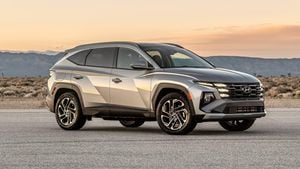Challenges and Changes in the Global Electric Vehicle Market
The global electric vehicle (EV) market is currently facing some serious speed bumps, particularly for manufacturers as demand fluctuates, and competition heats up. Major shifts are underway, with China’s electric car dominance putting pressure on both U.S. and European automakers. At the heart of this issue is the tug-of-war over prices, technological advancement, and consumer demand all entangled with international relations.
Chinese car manufacturers account for over 60% of the world’s EV production and dominate the EV battery market, producing around 70% of the batteries used globally. This unfair competition is giving European manufacturers like Volkswagen and Ford serious anxiety. Adverse competition is compounded by new regulations and tariffs imposed by the European Union (EU), which are pushing prices upwards and prompting significant changes to manufacturers' strategies.
For carmakers within Europe, this reality has led to increasingly tough decisions. According to the European Automobile Manufacturers’ Association (ACEA), battery-electric vehicle sales across the EU have taken quite the nosedive, plummeting by nearly 5% year-to-date. Despite overall stable car registrations, this downturn indicates shifting consumer preferences and potential waning enthusiasm for electric options.
On the opposite side of the Atlantic, the U.S. market is driven by different dynamics. EV sales surged by 11% year-over-year in the third quarter of 2024, with total sales reaching 346,309. The problem arises with the U.S. government seeking to wean the nation off its dependency on Chinese goods and materials. With new tariffs looming under the potential second Trump administration, there are growing concerns about sticker shock for consumers.
Meanwhile, the challenges don't end there for Europe’s established automotive giants. Ford has revealed plans to slash its European workforce by around 4,000 jobs due to slips in demand and the fierce rise of competition from Chinese firms. Innovation isn’t keeping pace either. The company’s European Vice President for Transformation and Partnerships, Dave Johnston, outlined, "It is important to take difficult but decisive action to safeguard Ford’s future competitiveness."
Volkswagen finds itself treading murky waters as well. The carmaker reported its profits dipped by 42% during the third quarter of 2024, necessitating drastic measures which may see the shutdown of several plants for the first time since its inception. The looming threat of closing plants sparks fears and highlights the troubling transition times for these manufacturers.
A particularly significant hit for Europe is the recent bankruptcy of Northvolt, once the region's beacon of hope for battery production. Founded by Peter Carlsson, ex-Tesla executive, the Swedish company filed for chapter 11 after struggling to ramp up production, burdened by mismanagement and too much reliance on Chinese components. The fallout from Northvolt's collapse has left Europe scrambling for battery suppliers, raising costs and compounding supply chain dilemmas.
Gene Berdichevsky, CEO of Sila, aptly remarked, "The world grossly underestimated how hard it is to make batteries. We are getting now to fewer players," which suggests industry consolidation may become necessary as firms struggle to adapt.
Throwing more fuel on the fire, China’s monopoly over the EV battery supply chain complicates matters for European automakers. Beijing produced over 70% of the world’s lithium-ion batteries, holding similar shares of the refining and manufacturing processes needed to produce EVs. This leverage puts Western manufacturers at significant risk, particularly as they become reliant on Chinese-sourced components—creating scenarios for potential price volatility and supply disruptions driven by geopolitical tensions.
Despite localized setbacks, China’s EV battery sector looks poised for rapid growth. Ouyang Minggao, noted for his contributions to the industry, anticipates the sector could balloon to worth 10 trillion yuan (around $138 billion) as the demand for battery applications grows across various sectors.
Returning to the North American market, President-elect Donald Trump's administration could herald another wave of disruption. Analysts fear his leadership, coupled with Elon Musk's anticipated role as “efficiency tsar,” could reshape the American automotive and EV landscapes. Musk's proposed austerity measures could catalyze efficiency across industries; yet they may also amplify tariff pressures on both U.S. and foreign manufacturers, driving up general costs.
On the European side, as EV take-up stalls, governments are finding themselves with tough choices. Countries like France are modifying subsidy structures to reduce governmental support amid rising public-sector deficits. The shift aims to balance budgetary pressures but could dissuade potential electric vehicle buyers at the same time. France’s decision to cut subsidies from as high as 7,000 euros to between 2,000 and 4,000 euros poses significant risks for industria.
This crossroad marks the next chapter for the global electric vehicle market, as companies, regulators, and consumers navigate through convoluted terrain. Trade wars, transitioning markets, the necessity for innovation, and shifting consumer preferences all converge to shape the future of electric mobility.
Can the automotive industry respond swiftly and effectively to changing dynamics? What’s next for car manufacturers as they seek to grasp the golden ring of green technology? These questions loom large as the sector races to adapt and endure.



